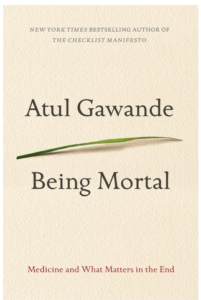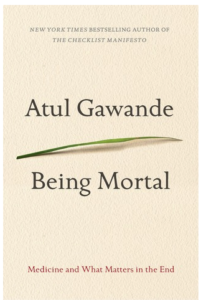
The last chapter, the last page, they come for us all. Some people plan for the times. Others leave it as dealing with the inevitable is depressing and difficult.
Gawande’s “Being Mortal” deals with a very difficult stage of life for everyone explaining how medicine pushes the envelope in every area of illnesses except one. It shows a great reluctance to deal with dying.
If one is lucky, really lucky, the final stage can be more dignified, more bearable and more acceptable.

The synopsis
Medicine is winning more and more in modern times, transforming birth, injury, and infectious disease from harrowing to manageable. But in the inevitable condition of aging and death, the goals of medicine seem too frequently to run counter to the interest of the human spirit. Nursing homes, preoccupied with safety, pin patients into railed beds and wheelchairs. Hospitals isolate the dying, checking for vital signs long after the goals of cure have become moot. Doctors, committed to extending life, continue to carry out devastating procedures that in the end extend suffering.
Gawande, a practising surgeon, addresses his profession’s ultimate limitation, arguing that quality of life is the desired goal for patients and families. Gawande offers examples of more free, more socially fulfilling models for assisting the infirm and dependent elderly, and he explores the varieties of hospice care to demonstrate that a person’s last weeks or months may be rich and dignified.
Full of eye-opening research and riveting storytelling, Being Mortal asserts that medicine can comfort and enhance our experience even to the end, providing not only a good life but also a good end.
Richard’s review
Being Mortal may run the reader through the gamut of emotions: from fear, anxiety, anger, resentment to acceptance, acquiescence and recognition. The book is a “tough read,” right from the opening chapters which describe the ageing process, the gradual decline and decaying process and medicine’s continuous capability of delaying the inevitable with technological and pharmacological innovation and discovery.
The first chapters concentrate on the ageing process and these can be frightening to read. Shifting theme soon, Gawande examines the changes taking place in how we take care of the aged. There are care homes which have changed their operations to make them more home-like rather than hospitals administering to the dying. Gawande demonstrates a caring empathy for the dying. Today, there are homes which have transformed themselves from simply being places for the dying to live their final days to places where the last days are days of dignity and positivity, where people can live out their last days with emphasis on the positive aspects of their lives, the love in their lives, their family, their friends…revisiting the memories to give the residents a more positive acceptance of the end.
Gawande’s analyses and descriptions of the various patients in their final stages of life is heart-wrenching and emotion-wracking. He writes with great care and empathy as he describes how each of these people copes with the last stages of their lives. After the anger and rejection, each sufferer who Gawande describes reaches a stage of acceptance and admission. Each works with their caregivers to plan how to make the final stages more acceptable, more fulfilling. When Gawande writes about his own father’s decline, the book’s emotional descent becomes even more poignant.
The final word
This book is not an easy read in any way. The subject matter is very difficult, very disturbing and for some readers, it may be very depressing. Rather than dwelling on the emotional decline and the challenge of these final days, Gawande’s message reaches for the loftier heights of giving hope and promise. There are homes, hospices, and professional caregivers who work with the dying in ways that makes the final stages of life more acceptable, developing courage and bravery among the afflicted to help them accept and better deal with the final phases of life.
Few are so lucky
Sadly, hidden behind the books intended positive message is the recognition that those who receive positive care, those who are living their final days in homes that demonstrate care, kindness, understand and empathy, these people are the lucky ones. Their last lottery has resulted in a lucky draw and they are in good places. Gawande implies that medicine and its related professionals do not give dying the consideration they deserve. There isn’t enough research, innovation and study being done in the area of the dying. Geriatric and aged care lack so much; these areas of medicine struggle need new recruits. There are hope and optimism in dealing with children, young adults and even the middle-aged, but little of these exist for the patient who is weeks, if not days away from dying. The recruitment numbers in these areas of medicine are in unacceptable and very serious decline.
Being Mortal is a clarion call for needed change in how we care for the dying and the number of professionals in the field.
The book was an eye-opening read. It was an emotionally demanding read where thoughts of one’s own mortality are constantly thrust to the forefront. Very sensitive, delicate readers may wish to avoid reading this book. Readers with greater emotional self-control may find it a more rewarding read as it is intended to be. A positive view of the last days of our lives.








